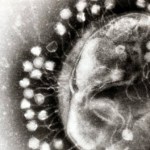gut bacteria
Science on Tap, which happened in Tel Aviv last Weds. eve, was as great a success as ever. Ariela Saba, one of our Weizmann writers, attended one of the talks. Here is her report:
Right around now – in some 55 bars all around Tel Aviv and Jaffa – Weizmann Institute scientists are starting their talks. Some of the patrons are in the middle of dinner; others are already sipping after-dinner drinks. Here in The Container at the Jaffa port, Dr. Eran Elinav is just warming up. From where I am sitting, I can see into the kitchen: Plates are making their way out laden with fluffy white bread, butter…
We were just getting used to the idea of our digestive tract as an ecosystem. There are 10 times as many bacteria in our gut as there are cells in our bodies, and the ecological balance between the different types might affect everything from our tendency to gain weight to our general health and susceptibility to various diseases.
Now, a Weizmann Institute researcher has exposed a whole new layer of this ecosystem: the viruses – called phages – that infect our gut bacteria.
Dr. Rotem Sorek and his team identified hundreds of these phages in the human gut. They were able to find them thanks to…
THE human gut contains a diverse community of bacteria which colonize the large intestine in the days following birth and vastly outnumber our own cells. These intestinal microflora constitute a virtual organ within an organ and influence many bodily functions. Among other things, they aid in the uptake and metabolism of nutrients, modulate the inflammatory response to infection, and protect the gut from other, harmful micro-organisms. A new study by researchers at McMaster University in Hamilton, Ontario now suggests that gut bacteria may also influence behaviour and cognitive processes such…

